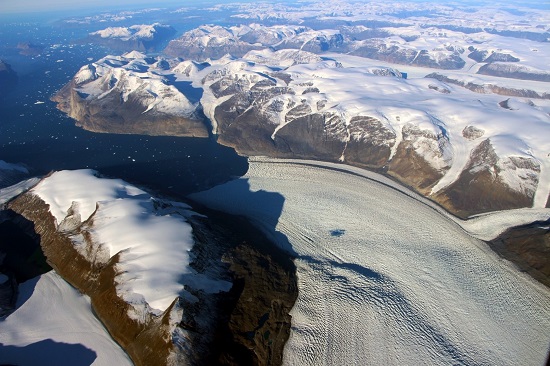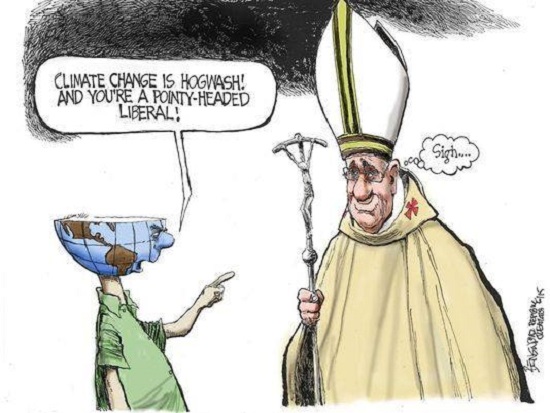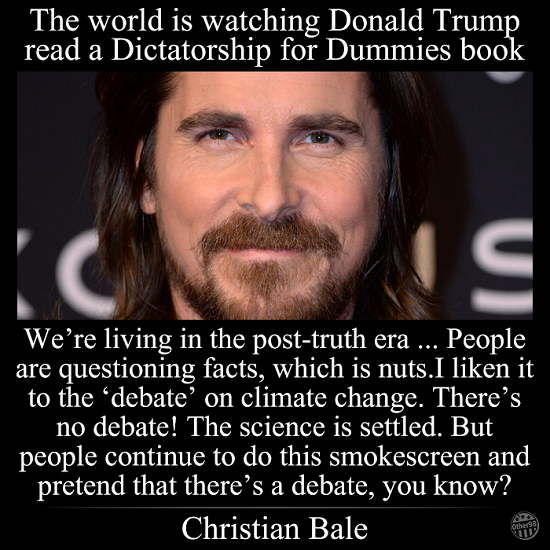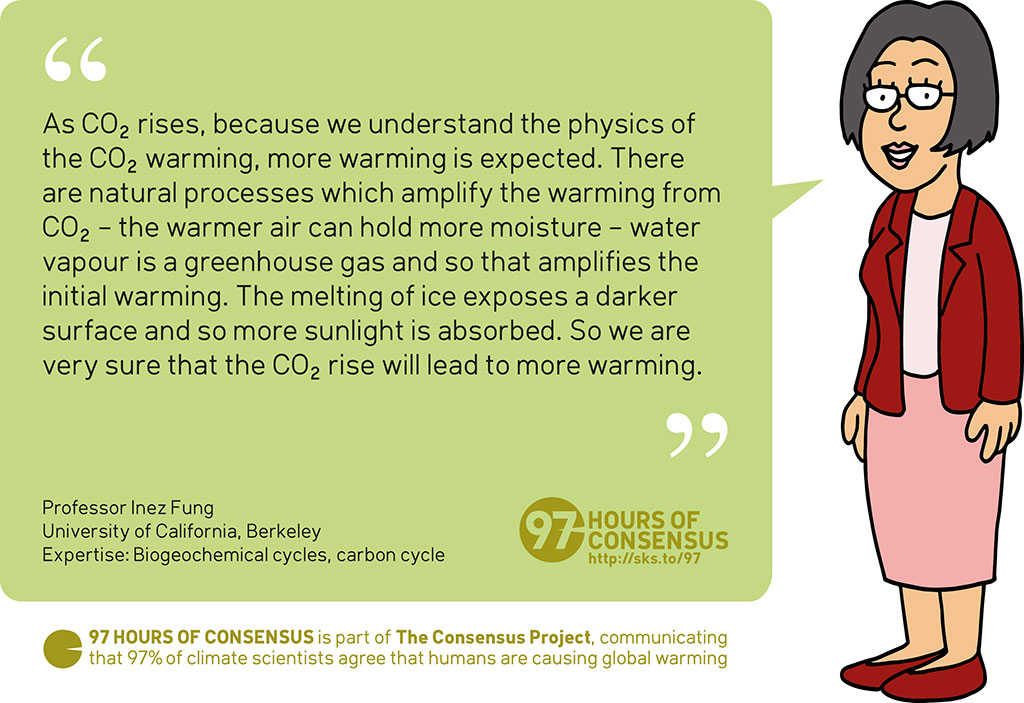2017 SkS Weekly Climate Change & Global Warming Digest #21
Posted on 28 May 2017 by John Hartz
Story of the Week... Editorial of the Week... Toon of the Week... Quote of the Week... Graphic of the Week... SkS in the News... SkS Spotlights... Video of the Week... Coming Soon on SkS... Poster of the Week... Climate Feedback Reviews... SkS Week in Review... 97 Hours of Consensus...
Story of the Week...
So much water pulsed through a melting glacier that it warped the Earth’s crust

Rink Glacier on Greenland’s west coast. (NASA/John Sonntag)
NASA scientists detected a pulse of melting ice and water travelling through a major glacier in Greenland that was so big that it warped the solid Earth — a surge equivalent in mass to 18,000 Empire State Buildings.
The wave – which occurred during the 2012 record melt year — traveled nearly 15 miles through the Rink glacier in western Greenland over four months before reaching the sea, the researchers said.
“It’s a gigantic mass,” said Eric Larour, one of the study’s authors and a researcher at NASA’s Jet Propulsion Laboratory. “It is able to bend the bedrock around it.”
Such a “wave” has never before been detected in a Greenland or Antarctic glacier. The total amount of mass carried in the wave — in the form of either water, ice, or some combination of both — was 1.67 billion tons per month, or 6.68 billion tons overall over four months., the study, published in Geophysical Research Letters, found.
So much water pulsed through a melting glacier that it warped the Earth’s crust by Chris Mooney, Energy & Environment, Washington Post, May 25, 2017
Editorial of the Week...
Trump: the biggest threat to Earth’s climate balance (commentary)

The Arc de Triomphe illuminated in green to celebrate the Paris Climate Agreement’s Entry into Force. While Trump has still not decided whether to withdraw the United States from the Paris pact, his policies are already undermining its goals. Photo by the U.S. Dep of State.
- The backward climate policies of Donald Trump, including his climate change denier agency appointments, and abandonment of the U.S. Clean Power Plan, are detrimental to the U.S. economy, the international community, and the fight against climate change, says this commentary written by two members* of the Network of Specialists in Nature Conservation, the WRI Brasil executive director and a senior Brazilian climate scientist.
- As the rest of the world moves toward a sustainable future — developing clean, cutting edge energy technologies and reducing fossil fuel emissions — the new president goes backward, embracing the dirty energy technologies of the 19th century.
- At a time when the world needs to urgently focus all its efforts on reducing greenhouse gas emissions, instead the global community — including the G7, G20, banks and multilateral agencies — must divert their attention to U.S. attempts to subvert the Paris Agreement.
- To counter this lack of leadership, nations like Brazil, India and Indonesia, along with civil society leaders, must fill the void created by the United States, attracting investment for low-carbon economies, and eliminating the inefficiencies of out-dated regulatory and governance models.
As Arctic sea ice shows record decline, scientists prepare to go blind by Gloria Dickie, Mongabay, May 25, 2017
*Rachel Biderman: executive director for World Resource Institute (WRI) Brasil.
*Carlos Nobre: climate scientist, member of the Brazilian Academy of Sciences, foreign member of the National Academy of Sciences, in the United States, and senior fellow of WRI Brasil. They are both members of the Network of Specialists in Nature Conservation.
Toon of the Week...

Quote of the Week...
Donald Trump has resisted pressure from Europe, Canada and Japan to declare his support for the UN’s landmark climate change treaty signed in Paris in 2015, marking a defiant end to his first international trip as US president.
The deadlock at the end of the G7 summit in Italy left other world leaders frustrated. The German chancellor Angela Merkel said the discussions “had been very difficult and not to say very unsatisfactory.”
“Here we have a situation of six against one, meaning there is still no sign of whether the US will remain in the Paris accord or not,” she added.
Instead, six of the seven nations used a communique at the end of the meetings to assert their commitment to implement the Paris plan, leaving Trump to tweet that he will decide next week whether the US will join them in their pledge.
Donald Trump will make 'final decision' on Paris climate deal next week by Patrick Wintour, Guardian, May27, 2017
Graphic of the Week...
The Greenland Ice Sheet's mass has rapidly declined in the last several years due to surface melting and iceberg calving. Research based on observations from the NASA/German Aerospace Center’s twin Gravity Recovery and Climate Experiment (GRACE) satellites indicates that between 2002 and 2016, Greenland shed approximately 280 gigatons of ice per year, causing global sea level to rise by 0.03 inches (0.8 millimeters) per year.
These images, created from GRACE data, show changes in Greenland ice mass since 2002. Orange and red shades indicate areas that lost ice mass, while light blue shades indicate areas that gained ice mass. White indicates areas where there has been very little or no change in ice mass since 2002. In general, higher-elevation areas near the center of Greenland experienced little to no change, while lower-elevation and coastal areas experienced up to 13.1 feet (4 meters) of ice mass loss (expressed in equivalent-water-height; dark red) over a 14-year period. The largest mass decreases of up to 11.8 inches (30 centimeters (equivalent-water-height) per year occurred along the West Greenland coast. The average flow lines (grey; created from satellite radar interferometry) of Greenland’s ice converge into the locations of prominent outlet glaciers, and coincide with areas of high mass loss.
Download the video: https://sealevel.nasa.gov/re…/…/greenland-ice-loss-2002-2016
More multimedia: https://sealevel.nasa.gov/multimedia
SkS in the News...
SkS is the focus of James Brugger's USA Today article, Find out what is true and false about climate change. He begins the article with:
Skeptical Science is a science education group run by a global team of volunteers. It's based on scientific literature that's gone through the peer-review process, meaning the research has been subjected to scrutiny by other experts in the same field.
followed by:
On its website, skepticalscience.com debunks many of the most common climate change myths, including these:
The first paragraph of Faye Flam's Opinion article, Why Scientific Consensus Is Worth Taking Seriously (Bloomberg View) cites and links to: Consensus on consensus: a synthesis of consensus estimates on human-caused global warming, John Cook et al, Environmental Research Letters, Apr 13, 2017
In his Fututrism article, There Are No Legitimate Arguments Against Human-Caused Climate Change, Tom Ward cites and links to the SkS rebuttal article, How do we know more CO2 is causing warming?. He also states that SkS is "a website that is highly worth looking through on other climate change related topics."
A new textbook, The Teacher-Friendly Guide to Climate Change, published by the Paleontological Research Institution includes both the SkS website and the Debunking Handbook in its listing of Online Resources. The is the answer to a question in its Q&A section contains a reference to: Consensus on consensus: a synthesis of consensus estimates on human-caused global warming, J. Cook et al, Environmental Research Letters, Volume 11, Number 4, 048002 doi:10.1088/1748-9326/11/4/048002.
SkS Spotlights...
Undark is a non-profit, editorially independent digital magazine exploring the intersection of science and society. It is underwritten by the Knight Science Journalism Fellowship Program, through a generous endowment from the John S. and James L. Knight Foundation.
The name Undark arises from a murky, century-old mingling of science and commerce — one that resulted in an industrial and consumer product that was both awe-inspiring and, as scientists would later prove, toxic and deadly. We appropriate the name as a signal to readers that our magazine will explore science not just as a “gee-whiz” phenomenon, but as a frequently wondrous, sometimes contentious, and occasionally troubling byproduct of human culture.
As such, the intersection of science and society — the place where science is articulated in our politics and our economics; or where it is made potent and real in our everyday lives — is a fundamental part of our mission at Undark. As journalists, we recognize that science can often be politically, economically and ethically fraught, even as it captures the imagination and showcases the astonishing scope of human endeavor. Undark will therefore aim to explore science in both light and shadow, and to bring that exploration to a broad, international audience.
Undark is not interested in “science communication” or related euphemisms, but in true journalistic coverage of the sciences.
Video of the Week...
Tipping the Scales on Climate Change
At a panel discussion co-hosted by Undark, thinkers from numerous disciplines gathered to consider an unwieldy issue. Here’s what they said.
The Editors, Undark, May 15, 2017
In its physical, political, and ethical dimensions, the climate change problem is mind-boggling — and perhaps more complex than any other humanity has ever faced. With that reality in mind, the Knight Science Journalism Program and Undark Magazine teamed up at the 2017 Cambridge Science Festival to present a short film and panel discussion aimed at bringing the problem down to size.
Panelists included Peabody Award-winning filmmaker Ian Cheney, whose yearlong Measure of a Fog series for Undark took a unique look at climate change as a scale problem. A 10-minute overview of that film series launched the event. He was joined by Anthony Leiserowitz, director of the Yale Program on Climate Change Communication; climate activist Nicole Hernandez Hammer; and former Obama climate policy adviser Bina Venkataraman. The panel was moderated by climate journalist Andrew C. Revkin.
“Belief that climate change is happening is at an all-time high, at 70 percent of Americans,” noted Leiserowitz, “and that shift upwards that we’ve seen in just the past couple years? That’s not happened among Democrats, it hasn’t happened among independents, it’s happened among Republicans. And not just liberal-moderate Republicans. The real shift has happened among conservative Republicans.”
And that, the panel agreed, is reason for hope, given that the political dimensions to the problem have proven far more difficult to overcome than the technological ones.
The full panel discussion — along with the debut of Cheney’s visually stunning short film, “Measure of a Fog,” can be viewed above.
Coming Soon on SkS...
- 2017 SkS Weekly Climate Change & Global Waming Digest (John Hartz)
- SkS Analogy 06 - Speakers, tuning forks, and global warming (Evan)
- The Republican Party’s intellectual rot is threatening the whole planet (Dana)
- Logic of Science: Anti-vaccers, climate change deniers, and anti-GMO activists are all the same (Fallacy Man)
- Guest Post (John Abraham)
- Explainer: Dealing with the ‘loss and damage’ caused by climate change (Carbon Brief staff)
- 2017 SkS Weekly Climate Change & Global Warming News Roundup #22 (John Hartz)
- 2017 SkS Weekly Climate Change & Global Waming Digest #22 (John Hartz)
Poster of the Week...

Climate Feedback Reviews...
Climate Feedback asked its network of scientists to review the article, The ‘ancient carbon’ of Alaska’s tundras is being released, starting a vicious warming cycle by Joe Romm, Think Progress, May 16, 2017
Three scientists analyzed the article and estimated its overall scientific credibility to be ‘neutral’.
A majority of reviewers tagged the article as: Accurate.
Click here to access the entire review.
SkS Week in Review...
- 2017 SkS Weekly Climate Change & Global Warming News Roundup #21 by John Hartz
- Global climate projections help civil engineers plan by John Abraham (Climate Consensus - the 97%, Guardian)
- NCSE's counter-Heartland flyers by Guest Author
- SkS Analogy 5 - Linear, Non-linear, and Coastal Flooding by Evan
- Trump's Fox News deputy national security adviser fooled him with climate fake news by Dana Nuccitelli (Climate Consensus - the 97%, Guardian)
- 2017 SkS Weekly Climate Change & Global Warming Digest #20 by John Hartz
97 Hours of Consensus...
































 Arguments
Arguments






























Regarding Joe Romm's Alaskan Permafrost Melt report, and the Scientific feedback that called it 'alarmist', it seems to me that many of the Scientists who critiqued it wished to err on the side of Scientific conservatism. But ordinary citizens aren't Scientists. We're more like stakeholders: we care about the planet because we live here. What is 'conservative' for the people Romm is writing for is not what is 'conservative' for a Scientist. For example, one researcher stated that if the permafrost melt leads to a 10% feedback (according to him, a 'large positive feedback' for climate), then a 1 C rise in temperature will actually lead to a 1.1 C rise, and then 1.11 C, and so on, from the permafrost melt. From a Scientists viewpoint, this appears prudently conservative, but, from the point of view of Romm's readers, what if he's wrong? It's not 'conservative' then, more like outlandishly optimistic. And just casually, its not lost on many of us that if a tray of ice is brought to 1 C, it doesn't melt by 10%, it melts by 100%. So the potential for catastrophe is certainly there: Romm is correct in noting that there is twice as much carbon in permafrost as there is in our atmosphere. Certainly these Scientists can admit there is at least a possibility of a 'thermal runaway', which is a term they really want to avoid using so as not to be called 'alarmist'. But imagine, for a second, the public's response if a Scientific paper got published that definitively showed the permafrost was in 'thermal runaway'. Such a situation is unrecoverable: that's how high the stakes are. I think the public would not be impressed by some Scientists being able to claim that at least they had been 'conservative', and that is the public Romm correctly has in mind.